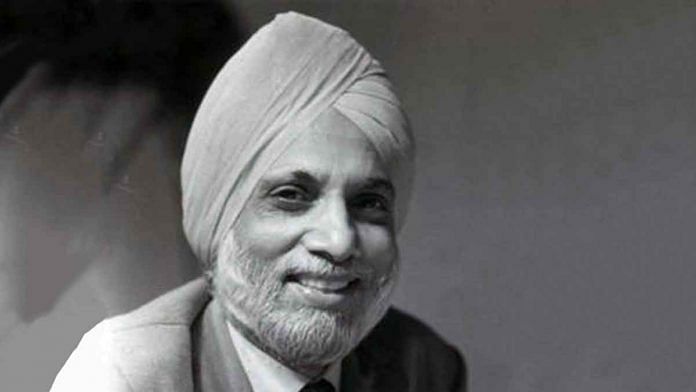On his 7th death anniversary, remembering Kartar Singh Duggal — a prolific author who wrote stories, novels, plays & poems in Punjabi, Hindi, Urdu and English.
Chandigarh: It’s been seven years since Punjab lost one of its most prolific writers and creative minds, Kartar Singh Duggal, at the age of 94.
The Encyclopaedic Dictionary of Punjabi Literature by R.P. Malhotra notes that Duggal is unique in Punjabi literature for having fictionalised important events in contemporary history. The way he has interwoven the “personal relationship of unforgettable characters with historical events shows his superb literary craftsmanship”, the book states.
Known primarily for his Punjabi short stories, Duggal was equally proficient in Urdu, Hindi and English.
Huge body of work
Duggal’s autobiography Whom To Tell My Tale, published by the National Book Trust, notes his entire body of work:
In Punjabi, 26 collections of short stories, 15 plays, 13 novels, nine poetry collections and nine other books.
In Hindi, another 12 short story collections and six plays.
In Urdu, three short story collections and four plays.
And in English, a combined 41 novels, plays and short story collections.
Writing style and themes
Born on 1 March 1917, in Rawalpindi, Duggal was heavily influenced by masters of the short story Guy de Maupassant and Anton Chekhov. He was also “in a fruitful dialogue” with contemporary Urdu short story writers like Krishan Chander, Rajinder Singh Bedi and Saadat Hasan Manto.
The Handbook of 20th Century Literatures of India by Nalini Natarajan and Emmanuel Sampath Nelson rates Duggal as the “finest Punjabi short story writer” and the “best-known master of this genre.”
The handbook praised the dialogues in his work for their “touch of delicate expression”. “His forte is his knowledge of the Potohori dialect spoken in the area around Rawalpindi, which is used in his fiction with remarkable felicity,” it states.
Duggal wrote on many themes, including sex and nudity, in his early days. Influenced by legendary psychiatrists Sigmund Freud and Carl Jung, he wrote on the inner workings of the minds of his protagonists, mainly women, in relation to their sexuality.
His greatest works, however, remain the stories about Partition and later, on the militancy in Punjab.
Also read: In Punjab, a library’s silent digital revolution is preserving the state’s heritage
Khushwant Singh’s tribute
When Duggal died on 26 January 2012, writer and columnist Khushwant Singh, who had known him for over 65 years, paid tribute in his weekly column, This Above All in The Tribune.
He had first met Duggal in 1940 in Lahore when young Singh was a lawyer at the high court. Singh would invite Punjabi writers home and ask them to read out their latest works. Duggal, working then at All India Radio, was a frequent invitee to these weekly meetings.
As Singh pointed out in an article on Duggal in 2007, he wrote while working as a radio producer, and later, as director of the NBT and advisor to the now-defunct Planning Commission of India.
Singh remembers him as a devout Sikh who would wake up at 4 every morning and “after reciting the Japji (the morning prayer) and writing a story or two, left for the broadcasting house”.
Singh also recalled that during the violent clashes between Muslims and Sikhs in 1947, Duggal, a devout Sikh, married Ayesha, the younger sister of Sultana — wife of eminent Urdu poet Ali Sardar Jafri. Duggal defied everyone and married Ayesha at the Golden Temple in Amritsar.
Singh rated Duggal’s rendition of the Guru Granth Sahib in simple Punjabi as his “lasting work”. The four volumes of the Guru Granth Sahib were among his later works, and were described as “transcreation” instead of “translation” in 2007.
Professor Jaswinder Singh, former head of the department of Punjabi and dean of academic affairs at Punjabi University, Patiala, also knew Duggal closely and recalled: “He was one of those rare writers whose personality matched what he wrote. He was, simple, warm and genuine. Always wore plain white clothes.”
For his work, Duggal received India’s third-highest civilian honour, the Padma Bhushan, as well as several other prestigious awards, such as the Sahitya Akademy Award, the Ghalib Award and the Soviet Land award.
Also read: Surprise: Nehru library also has the best collection of RSS’s Hedgewar, Savarkar papers



